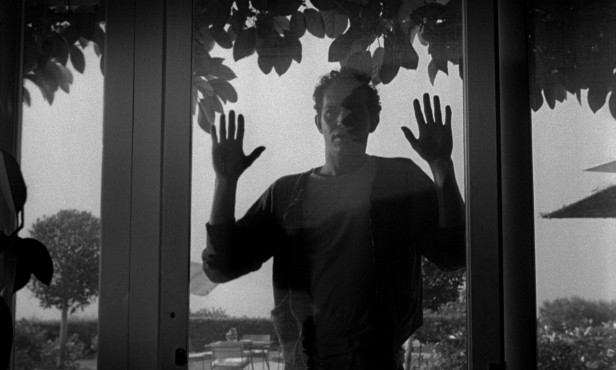
Dir.: Leslie Stevens; Cast: Kate Manx, Corey Allen, Warren Oats, Robert Ward; USA 1960, 79 min.
Leslie Stevens (1924-1998) is hardly a household name – but the director/writer of PRIVATE PROPERTY – a film wrongly panned by Andrew Sarris – has contributed significantly to film history: he not only adapted the play The Left Handed Gun by Gore Vidal for Arthur Penn’s screen version of 1958; but, as executive producer of Daystar Productions, he was responsible as writer and director for the cult series The Outer Limits (1963-65).
PRIVATE PROPERTY starts with a long tracking shot, two men seemingly crawl out of the ocean and walk along the beach. They soon steal from a petrol station attendant, and force the guy, who gave them a lift to LA, to follow a posh Corvette car, driven by an attractive blond woman. Then Duke (Allen) and Boots (Oats) settle into an empty house in Beverly Hills, overlooking the property of Ann (Manx) and Roger Carlyle (Ward). Whilst watching Ann sunbathing, Duke promises Boots, who has never slept with a woman, and is obviously gay, that he will make Ann sleep with him. Duke, a psychopath who can mirror the wishes of people he wants to seduce, gets to work, and introduces himself to Ann as a gardener. The bored housewife is only too glad of company, her husband spends all day in the office and travels often, and she and Duke get very close. But when Duke is about to make his move, he introduces Boots and Ann runs away from him. What follows is a surprising orgy of violence.
Shot in five days for $60 000 at the home of the director, who was married to Manx at the time – she would commit suicide at the age of 34 after they split up in 1964. PRIVATE PROPERTY was condemned by The League of Decency and did not get a PCA certification. It nevertheless grossed over two million US dollars, even though it could only be seen outside the big cinema chains. Stevens, who had worked with Orson Welles at the Mercury Theatre, shared his former boss’s taste for unsettling subjects, and innovative camera angles. DoP Ted McCord (East of Eden, The Sound of Music) moves the camera often from the POV of Duke and Boots, catching Ann like an animal in the zoo: she is their object; but, in spite of Freudian innuendos, like opening a bottle of perfume with a stopper resembling a dildo – not a sexual one. Duke is only interested in his power games, and for Boots, she represents just a fairy-tale figure, who he wants to admire but only from a safe distance. The black and white images, sometimes grainy, sometimes dreamy, capture a creepy atmosphere, a sort of harbinger of the future when the Manson gang would commit their murders ten years later. AS
SCREENING DURING BFI LONDON FILM FESTIVAL 5-16 OCTOBER 2016